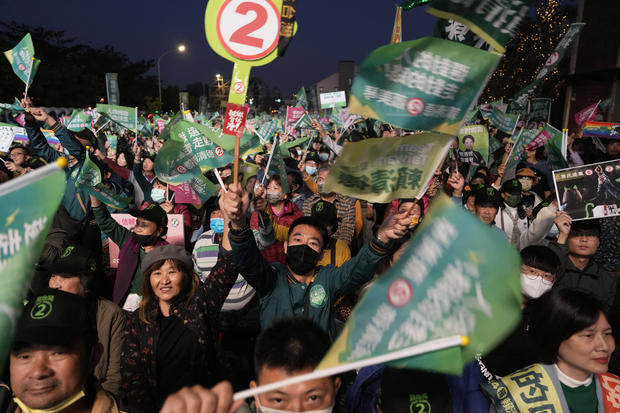
Lai Ching-te, the candidate from the ruling party, emerges victorious in Taiwan’s presidential race.
Lai Ching-te, the candidate from the ruling party, has won Taiwan’s presidential election. His opponents have accepted defeat after voting took place at numerous polling locations in a closely contested three-way race.
The outcome of the presidential and parliamentary election in Taiwan will determine the future course of China-Taiwan relations for the next four years. This election holds great significance as it impacts the peaceful coexistence and stability of the narrow strip of water separating mainland China and the independent island, which China claims as its own. China has previously framed the election as a decision between peace and conflict.
On Saturday, President Biden addressed reporters as he was leaving the White House and stated that the United States does not endorse Taiwan’s independence, in response to a question about his thoughts on the recent elections.
Before the election, political analyst Michael Cole from Taipei spoke with CBS News.
Antony Blinken, the Secretary of State of the United States, extended his congratulations to Lai on his victory in the election. He also praised the people of Taiwan for showcasing the resilience of their strong democratic system and electoral process.
Blinken stated that the United States is dedicated to preserving peace and stability between the two sides of the Taiwan Strait, and resolving any disagreements through peaceful means without the use of force or coercion. The relationship between the American and Taiwanese people, based on shared democratic principles, continues to expand and strengthen through various connections in the realms of economics, culture, and personal relationships.
In a statement released on Saturday morning, Mike Johnson, the Speaker of the U.S. House of Representatives, praised Lai and expressed his support for security and democracy in the region during a meeting with Taiwan’s ambassador to the U.S., Alexander Yui.
Johnson stated that he plans to request that the leaders of appropriate committees in the House of Representatives lead a group to Taipei following Lai’s inauguration in May.
Former House Speaker Nancy Pelosi took to X on Saturday to offer congratulations.
It is thought that Beijing preferred the candidate from the Nationalist party, which has a more favorable stance towards China and is also called Kuomintang or KMT. Their candidate, Hou Yu-ih, has pledged to resume negotiations with China and strengthen national defense. He has also guaranteed not to pursue reunification with the other side of the Taiwan Strait if elected.
The other leading candidate was , is a mayor in Taipei.
Ko Wen-je, the mayor of Taipei, is a member of the Taiwan People’s Party., or TPP. A former mayor of Taipei, he had drawn the support of young people wanting an alternative to the traditional parties, which have largely taken turns governing since the 1990s.
Tony Chen, a 74-year-old retired individual, cast his vote in Taipei during the final hour of the election. He saw the election as a decision between communism and democracy.
He expressed a desire for democracy to prevail. He elaborated that in the past, many Taiwanese were receptive to China’s governing system during its rapid economic growth, but have since been turned off by the suppression of freedoms under President Xi Jinping.
Stacy Chen, 43, expressed her consistent support for DPP due to her belief in Taiwan’s sovereignty as an independent nation. She shared that her desire for her son’s upbringing in a distinct country from China is a driving factor in her voting decisions.
Joanne Kuo, a stringer for CBS News, expressed her fear of a potential Chinese takeover of Taiwan and stated that she would be unable to tolerate living under the control of the Chinese Communist Party.
Kuo expressed skepticism about how the election results align with the democratic and freedom values of Taiwanese people.
“
The recent history of Hong Kong
According to Cole from the International Republican Institute in Taipei, this is definitely something that the Taiwanese do not want for themselves. This statement was made prior to the election.
Other than the ongoing tensions with China, the main focus of the campaign has been on domestic problems, such as the lack of affordable housing and stagnant wages. The growth of Taiwan’s economy was only 1.4% last year, which can be attributed to the natural fluctuations in demand for computer chips and other exports from the country’s highly dependent manufacturing sector, as well as the slowdown of the Chinese economy.
Ng Han Guan / AP
Ben Wang, 44, saw the vote as an opportunity to change the relationship between Taiwan’s two main political parties, the DPP and the KMT. He believed that Taiwan’s actions could not prevent a possible attack from China.
Gabrielle Reid, associate director at the global intelligence consultancy S-RM, stated that the election in Taiwan is expected to significantly impact the geopolitical landscape in a meaningful way.
She stated that the result of the vote will ultimately impact the relationship between China and the West and will greatly affect the situation in the South China Sea.
Source: cbsnews.com